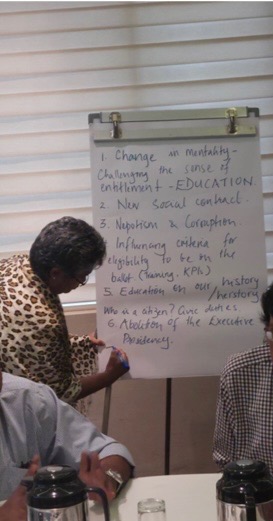From January 31 – February 1, 2023, the University of South Carolina’s Rule of Law Collaborative (ROLC) delivered a series of workshops and trainings as part of ROLC’s Sri Lanka Think Tank Capacity Building (TTCB) project. On January 31, ROLC and its implementing partner, Strategic Inspirations (SIPL), organized a series of roundtables on “Broader strategies for think tanks moving forward.” The workshop took place on the eve of the 75th anniversary of Sri Lanka’s independence, and participants explored a range of critical challenges that think tanks in the country were facing. In addition to hosting the eight think tanks that the TTCB project is supporting, the workshop also featured high-level representatives from The Asia Foundation, the Centre for Policy Alternatives (CPA), the Law and Society Trust the Collective for Historical Dialogue and Memory (CHDM), Pact, and LIRNEAsia.
On January 31, ROLC Senior Fellow and consultant Jerome Hansen also provided an in-person training on “Near-term Advocacy Options in the Current Sri Lankan Context.” The workshop focused on the role and importance of evidence-based advocacy; what makes an effective think tank; traditional and rights-based advocacy tactics; and current advocacy strategies among Sri Lankan think tanks.
On February 1, ROLC’s Research Program Manager Atif Choudhury provided a full-day, in-person, interactive training workshop on action research innovations with advocacy applications. The training workshop focused on track 1.5 diplomacy, hackathons, project incubators, simulations, and open data tools. The workshop incorporated two ideation labs, which entailed partnering Sri Lankan think tanks designing research and advocacy programming that incorporated the tools featured in the workshop.
The Rule of Law Collaborative is helping Sri Lankan think tanks improve their research, advocacy, and organizational capacities. The TTCB project is funded by the State Department’s Bureau of Central and South Asian Affairs (SCA).

